|






Click the flag
Meet our special
U.S. Publishers
|
Therapeutic
Board Games
Main
Booklist

Complete
List
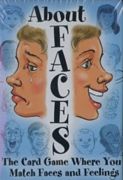
|
About Faces: the Card
Game Where You Match Faces and Feelings. Childswork/Childsplay,
$27.50 (ages 4 & up)
Recognizing the feelings of others is a
vital skill for all social interaction. Although words, tone of voice, and
gestures are also important, the most reliable way to learn the feelings of
others is through observing facial expressions. Many children, including those
on the autism spectrum, have trouble “reading” facial expressions through
observation. The ABOUT FACES CARD GAME includes 52 cards with faces
representing thirteen different feelings. By practicing matching the feelings
and the faces, children learn to read facial expressions, which is a critical
social interaction skill. There are several ways to play the ABOUT FACES CARD
GAME to help children recognize, express, and explore their feelings and the
feelings of others. |
|
Anger Alert! Listen to Your Body's Anger
Warning Signs and Control Your Temper... Before It's Too Late! Max Nass
& Marcia Nass, $42.95 (ages 7-12)
Some of us clench our fists; some tremble; others have
the urge to throw something. All of us experience physical symptoms — warning
signs — when anger is about to erupt. This clever card game introduces kids to
these "anger alerts" and teaches 10 easy strategies they can use to
calm down and retain their composure. As players race to get rid of their
cards, they respond to anger-provoking situations. But before responding, they
must invert an hourglass timer and wait 7 seconds. This delay reminds kids to
stop and think before they act. An eye-catching poster displaying both anger warning
signs and anger control strategies is included, along with four colorful sand
timers. Includes Leader’s Introductory Guide; 1 Poster (Anger Warning Signs on
one side, Anger Controls on the other side); 4 Impulse Control Timers; 50 Anger
Spark Cards; 10 Anger Warning Sign Cards; and 6 Swap Cards. For 2 to 4 players. |
|
Anger IQ. Franklin Learning Systems, $79.95
Learning anger control skills can help prevent bad
decisions; however, direct knowledge of how anger affects the decision making
process can give individuals an extremely useful tool to avoid mistakes. This
board game educates players about these hazards and then helps them practice
avoiding them by using principles for dealing with anger. Players learn to
translate rehearsal of responsible decisions made under conditions of anger to
the real world. This combined with the use of CBT and Social Learning Theory
makes this particularly effective. Game includes a CD with a PowerPoint
presentation that serves as a review of new anger research and an introduction
to the game. |
Back to top
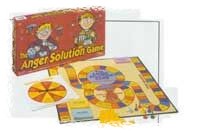 |
Anger Solution Board Game:
Teaches relaxation techniques and self-control. 2-4 players, $79.95
(ages 7 to 12); Anger Solution Card Game, $36.50 |
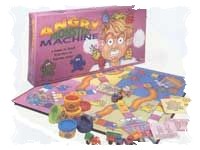 |
Angry Monster Machine:
a game to teach kids how to express anger. 2-4 players, $65.95 (ages
5-10)
|
|
Any Game Cards.
Max Nass & Marcia Nass, $36.50 (ages 6 and up)
The Any Game Cards package was
developed for use with popular games. Simply add in these one sentence
cards to any game to make the game into a therapeutic tool for young
children. There are six different card sets featuring relevant questions
about Bullying; Social Skills; Self Esteem; Character Development
and Health. Clinicians can also use the cards as a tool for opening
up discussion in individual or group sessions.
|
Back to top
|
Aware Aardvark: Be Safe, Be Aware & Be Alert.
Donna McGoff, $29.95 (ages 6-13)
Aware Aardvark is a card game that is easy to
learn. It is designed to teach kids how to become more responsible, make better
decisions, and develop greater personal awareness when finding themselves in
situations that can compromise safety. Learning these skills enhances
confidence and empowers kids. The game includes 96 cards, 12 blank cards (to
create your own cards), directions, and a sturdy storage box.
- Engaging game that teaches children to be safe, aware, &
alert
- Encourages being responsible & making good decisions
- Engaging activity for ages 6-13
- Useful for counselors, parents, and teachers
- Developed by a child therapist
|
|
Blurt It Out! The "Say What You Think"
Sentence Completion Game. Thor Johansen, $45.95 (ages 6-14, 2-4 players)
Children will find this game to be a fun and pleasurable
way to learn about themselves, as they learn how to express themselves. This
engaging game allows therapists and counselors to assess psychological
processes quickly and effectively in a playful and non-threatening way, while
helping the child to increase self-awareness and self-understanding. Together,
game participants will find new ways to solve problems, identify their
emotions, and communicate effectively. The game includes four feelings decks,
and two bonus decks. Therapists and counselors have considerable flexibility in
how they use these decks. Blank cards, directions, suggestions for use, die, a
bag of chips, and a sturdy storage box are included.
- Useful for assessment & intervention
- Four feelings decks: Happiness, Anger, Anxiety, & Sadness
- Two bonus decks: Exploring Bullying & Exploring Divorce
- Developed by a child psychologist
|
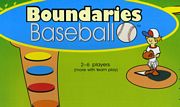 |
Boundaries Baseball®.
Franklin Learning Systems, $69.95 (for 2-6 players; grades 1-4)
Players have a great time playing baseball as they learn to understand and respect boundaries. |
Back to top
|
Brain Boosters for Groups In a Jar®. Susan
Ragsdale & Ann Saylor, $16.99 (ages 12 & up)
101 active games to encourage brain development and team
building in classrooms, advisory groups, after-school programs, teams, and
youth groups. |
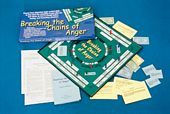 |
Breaking the Chains of Anger®. Franklin Learning Systems, $73.95 Breaking the Chains of Anger® is an educational board game designed to teach important concepts and practical skills for controlling anger and avoiding violence. Players earn play money by giving good advice on how to deal with frustrating and anger provoking situations, both at school and at home. Players are introduced to the concept that anger can carry you away towards actions that will be regretted later. Skills are introduced that help players stay calm, make good decisions, and prepare for difficult situations. Grades 5 - 8 (also suitable for older special needs students). |
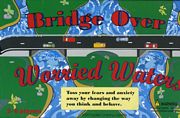 |
Bridge Over Worried
Waters Franklin Leaning Systems, $49.95 Grades 1-8
Anxiety affects normal day-to-day activities
and causes considerable emotional and physical distress as well
as impaired academic and social functioning. The recommended
treatment approach for anxiety is overwhelmingly Cognitive Behavior
Therapy (CBT). CBT helps children learn to handle their fears
and worries by modifying the ways they think and behave. Techniques
included in CBT are relaxation, positive self-talk and coping behaviors.
Bridge Over Worried Waters is essentially a CBT program in
a box that incorporates all of these techniques. |
Back to top
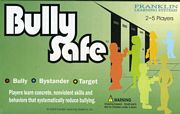 |
Bully Safe. Franklin
Leaning Systems, $36.95 Grades 5-8
Bully Safe is an educational
card game that teaches a systems approach to reducing bullying behavior.
|
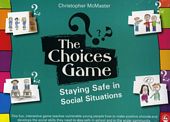 |
The Choices Game: Staying Safe in Social Situations. Christopher McMaster, $51.95
This fun, interactive game teaches vulnerable young people how to make positive choices and develop the social skills they need to stay safe in school and in the wider community. |
|
The Chronic Illness Game. Isabelle
Streng & A.M. Stradmeijer, $81.95 (ages 6 to 16)
The Chronic Illness Game facilitates
the improvement of social skills and coping strategies in children
with a chronic illness who often suffer from impaired psychological
and social development. The goal of the game is to achieve sharing
and understanding of the isolation and the painful and complex feelings
experienced by children with a chronic medical condition. Based
on an integrative psychotherapy model, it incorporates systemic
and cognitive-behavioural orientations and should be facilitated
by a health or mental health professional (who may participate as
a co-player) and is intended for use with groups of up to six players
— with families or individuals.
|
Back to top

|
Circle
of Friends: a Fun Game That Shows You How to Make-and Keep-Friends.
2-6 players, $81.95 (ages 5-12)
Kids learn friendship-building skills
such as listening, patience and paying attention, and how to deal
with various friendship issues, such as teasing, bullies, jealousy,
anger and more. |
|
Consequences Board Game. $36.95 (2-4 players; ages 3
and up)
The game of CONSEQUENCES is a fun way to
introduce or reinforce the idea that there are consequences for all actions and
behavior. Each card has an everyday task or behavior that results in a forward
or backward move. Follow the colorful stone path to the park, take a ride on
the slide, go for ice cream, and end at Waterland! |
Back to top
|
The Coping Game: a Recovery Activity for Better Mental
Health, Revised Edition. $57.95 (ages 16 and up)
This engaging game encourages those recovering from
mental illness to recognize stressors and warning signs of negative symptoms,
and identify specific coping strategies and behaviors that reduce stress and
encourage wellness. The game reinforces healthy lifestyles with the use of
humor and peer interaction
As players move along the path they may be directed to
emergency services, the doctor's office, drug & alcohol rehab, a support
group, or nature walk. |
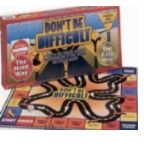 |
Don’t Be Difficult:
a game to help children consider the consequences of both positive
and negative choices. 2-6 players, $74.95 (ages 7-12)
|
|
Dr.
PlayWell’s Coping with Stress Card Game. 2-4 players, $34.50
(ages 6-12)
This fun-filled game teaches children how to handle stress using
well-researched stress reduction techniques that include: Deep Breathing
& Muscle Relaxation; Visualization; Self-Talk; and Creating
a Healthy Lifestyle.
Other Dr. PlayWell card games
include:
Caring About Others Card Game; Communicating
Feelings Card Game; Controlling Anger
Card Game; Dr. PlayWell’s Positive Thinking Card
Game. For 2-4 players (ages 6-12) |
|
Dr.
PlayWell's Worry Less Game. 2-4 players, $79.95 (ages 5-12)
This game can help children with fears
and anxiety disorders, and it can also be used as a prevention tool.
As players try to capture the Worry Monsters, they learn important
steps for dealing with persistent worry such as identifying feelings,
self-calming, making positive self-statements, changing negative
thoughts, planning, coping with difficult feelings, and self-monitoring.
Also: Dr. PlayWell's Game of Self-Control; Dr. PlayWell's Don’t Pick On Me Game;
Dr. Playwell’s Don’t Stress Game; Dr. Playwell’s
Best Behavior Game; Dr. Playwell’s Think
Positive Game (ages 5-12) |
Back to top
|
The Emotional Intelligence Game™. Franklin Learning Systems, $57.95
(2-5 players; Grades 2-8)
Emotional intelligence is the ability to
handle one's own emotions and to read and respond to others' emotions in ways
that create positive relationships. Research tells us that emotional
intelligence may have more to do with life success than cognitive intelligence
or academic performance. Mental health professionals agree that it is a
protective/resiliency factor against depression, anxiety, anti-social behaviors
and drug/alcohol dependence.
There are two versions of the game and
corresponding sets of rules, competitive and cooperative. The game
utilizes the techniques of both CBT (cognitive behavior therapy) and social
learning theory to help the players build their emotional intelligence. |
|
Escape from Anger
Island® Franklin Learning Systems,
$77.95 (Grades 1-5)
It is difficult to teach children anger
management skills, but it can be done with patience and practice.
Escape from Anger Island™ includes a reproducible Anger
Management Checklist and a Skills Record (to keep track of which
players have practiced which skills), and a facilitator booklet
with complete lesson plans, suggested activities for practice between
sessions, and questions for discussion. Escape from Anger Island®
is a fun and inventive way to help kids learn about anger.
|
|
Expressionary! A Guessing Game Using Words, Movements,
and Sketches, Revised Edition. $86.95 (ages 12-17)
Expressionary! is a game for teens and adults
about feelings — what situations bring them up and the many different ways they
can be expressed. Whether through words or non-verbally through movement and
drawings, Expressionary! makes it easy and fun for players to express
their feelings and thoughts. The object of the game is to have the highest
number of tokens through correctly guessing other player's expressions, and
being able to effectively communicate with others. The game is a must-have for
every educator's, therapist's, or family's game collection! 4-12 players. Ages:
12 through adult. |
Back to top
|
Feelings
Fair®. Franklin Learning Systems, $67.50 (Grades 1
– 5)
Feelings Fair® is a new
board game specifically designed to give students important skills
for recognizing feelings in themselves and others, expressing feelings
in a mature way, and handling difficult situations that involve
strong or negative feelings. The game box contains two sets of Solving
Problem Cards (one for grades 1 and 2, and one for grades 3 - 5).
|
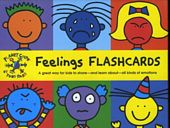
|
Feelings FLASHCARDS. Todd Parr, $21.99
A great way for kids to share — and learn about — all kinds of emotions. |
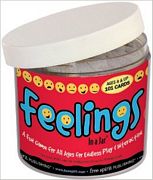
|
Feelings In a Jar® - A Fun Game for All Ages for
Endless Play & Interaction. Deborah Jiang Stein, $14.99 (ages 8
& up)
More Feelings In a Jar®. Deborah Jiang Stein, $14.99
(ages 8 & up)
Everyone needs to know how to name and express feelings.
Each jar holds 101 little cards printed with “feelings words” — gleeful,
insecure, grateful, angry, cranky, courageous, hopeful, and many more. Explore
expressing feelings by discussing what it means to be defiant,
compassionate, glum, bold, jovial, and many more usual and unusual feelings.. Pull out a slip and act out the feeling, or invite
someone else to act it out. Use as discussion starters, journaling prompts, or
icebreakers for groups. |
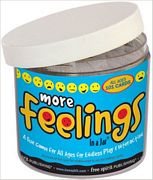
|
Back to top
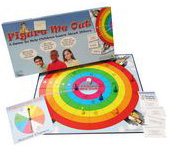
|
Figure Me Out Board Game: a Game to Help
Children Learn about Others. Childs Work/Childs
Play, $79.95 (ages 6-12)
This develops social skills by helping
children learn to gather information about others and share information about
themselves. Children take turns assuming the role of a reporter, getting to the
bottom of a story by using Who, What, When, Where, and How questions to figure
out what another player is thinking. These conversational skills are used to
teach children how to begin and maintain an interesting conversation. A variety
of topics (a hobby that interests me, a movie I saw recently, my favorite
season, etc.) are used to generate ideas, or stories, for the players to figure
out. The object of the game is to complete a full circuit of the game board and
file your story by the deadline. Designed for children with Asperger Syndrome
in mind. |
|
Friendship Explorers®. Franklin Learning Systems, $34.50, Grades 1–7
Friendship Explorers® is a cooperative game that helps players understand similarities and respect differences. Players answer open-ended questions to earn pieces to a 9” x 21” jigsaw puzzle map of the world. Everyone wins when the puzzle (see below) is completed. This game will help build a community that fosters honesty, acceptance, and mutual respect. |
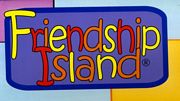 |
Friendship
Island®. Franklin Learning
Systems, $73.95 (for 2-6 players; grades 1-4)
Social skills needed for positive peer relations are some of the most important skills to be learned during elementary school years. Friendship Island® is an educational game specifically designed to teach these skills to students. The game focuses on the three vital areas of friendship: making friends, being a good friend and resolving disagreements in a win-win way. |
Back to top
|
Furious
Fred® Franklin Learning Systems, $67.50 (Grades 2-5)
This educational board game designed to teach important concepts
and practical skills for controlling anger and avoiding violence.
Fred is a student who in the past has been quick to get angry and
quick to try to get back at others with screaming, threats, pushing,
and hitting. Players earn points by giving Fred good advice on how
to deal with frustrating and anger provoking situations, both at
school and at home. |
|
Girl Games: Five Fun
Card Games for Girls Grades 5-12 That Teach Important Social Skills.
Trice Black, $28.95
The 5 games in this colourful deck
are fun and easy to play. Cards include different topics with
thought-provoking questions that can help facilitate meaningful
discussions. Each card game focuses on one aspect of bullying
or relational aggression such as:
Respect, Safety, Lying, Gossip, Bullying, Rumors,
Self-Improvement, Body Image, Pride, Emotions & Communication,
Conflicts, Listening, Patience and more |
|
Go Fish Card Games. Franklin Learning Systems, $21.95 Each
Play-2-Learn GO FISH® play like classic Go Fish. There are
two decks of 50 cards in each game — one for grades K-2 and the other for
grades 3-5. The games differ from classic Go Fish in that players must answer a
question before they can accept a requested card. Instead of the usual number and
picture cards, the cards have fun pictures of fish and fish names. For example,
a player may ask, "Do you have any Henry Herrings?" If the player receives a Henry Herring
card, the player reads the question on the card aloud and answers it. All questions are open ended. If the player did not have any Henry
Herrings, the player would say, "go fish," and then the first player would
take a card form the "ocean" (extra cards in the center of the table). Each game also comes with a rules
sheet and facilitator guidelines.
Play-2-Learn GO
FISH® games are $21.95 each:
Go FISH: Anchor
Your Stress
Go FISH: Beware
of Bully Bait
Go FISH: Cast
Away Conflict
Go FISH: Catch
and Release Your Anger
Go FISH: Catch
Good Character
Go FISH:
Fishing for Feelings
Go FISH: Hooked
on Friendship
Go FISH: Manners are a Good Catch
Go FISH: New Fish in
School
Go FISH: Reel
in Responsibility
Go FISH: School of Success
Go FISH: Stream
of Self-Esteem
Go FISH: Swimming Toward Self-Control
|
|
|
|
|
|
|
|
|
|
|
|
|
|
|
Back to top
|
Helping, Sharing and
Caring Board Game: a game to promote communication and social
skills. 2-6 players, $67.95 (ages 4-11)
Helping, Sharing and Caring Card Game. $33.95 |
|
Hey, Dad! Let's
Talk: a Game for Keeping Families Connected. $27.50 (ages
3 and up)
Sometimes fathers and children find it hard to talk to each other. Hey Dad! Let's Talk is an easy and fun to play board game designed to help dads and kids build stronger relationships. For 2-5 players. |
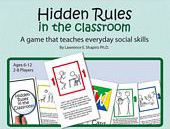
|
Hidden
Rules in the Classroom Card Game: a Game That Teaches Everyday Social
Skills. Lawrence Shapiro, $34.50 (ages 6-12)
Hidden Rules in the Community Card Game: a Game
That Teaches Everyday Social Skills. Lawrence Shapiro, $33.95
(ages 6-12)
Hidden Rules with Friends Card Game: a Game That
Teaches Everyday Social Skills. Lawrence Shapiro, $33.95 (ages
6-12)
Hidden Rules: a Game That Teaches Everyday Social
Skills. Lawrence Shapiro, $34.50 (ages 6-12)
Hidden Rules (or Hidden Curriculum) is a
term used to describe unwritten social rules and behaviors that most of us seem
to know without ever being taught, such as respecting those in a position of
authority, acknowledging others' personal space, speaking at an appropriate
volume, paying attention to body language, and more. These fun card games will
help children learn and practice 40 hidden rules in classroom situations. 2-8 players |
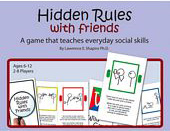
|
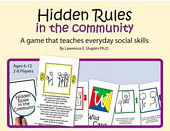
|
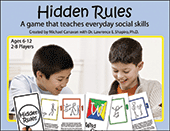
|
Back to top
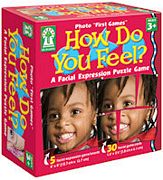
|
How Do You Feel?
A Facial Expression Puzzle Game. $14.95 (ages 3 and up)
How is the child in the photo feeling? Search and find the pieces to show the same expression! Not only will this game increase visual discrimination skills, it is a great tool for talking about feelings. How Do You Feel can be enjoyed as a solitary matching activity or played as a game with two to five children. |
|
The
Impulse Control Game™. Franklin Learning Systems, $72.95
(Grades 2 – 7)
The Impulse Control Game™ is
an educational and therapeutic board game designed to help young
people with ADD, ADHD, and other conditions involving impulse control
problems. The game box includes a teacher booklet with complete
lesson plans, suggested one-on-one coaching activities, a list of
activities to give to parents that will help them reinforce the
skills learned in the game, references to the studies that demonstrate
the efficacy of the skills in the game, and suggestions for further
reading.
|
|
Journey
to Friendsville™ Franklin Learning Systems, $72.95 (Grades
1-5)
Board games are a very effective way
to teach social skills, but many counselors do not have the time
to play a traditional board game with their clients. Journey
to Friendsville™ is designed with the busy counselor in mind.
Kids learn social skills and how to develop rewarding friendships
in 15 minute increments as they journey on the game board towards
the town of Friendsville. There are five skills in total, and one
skill is the focus of each 15 minute session. Kids can play multiple
times to learn all five skills. |
|
Let's Make Friends Card Game. Max Nass &
Marcia Nass, $25.95 (Grades K-6)
Friendship making skills will resonate throughout a
child's lifetime as a basic human need. Let's Make Friends teaches children how
to develop relationships with peers in which they feel liked respected and
valued. The main categories of this fun-filled card game contain the most important
skills to making and keeping friends. |
Back to top
|
Lifeskills Card Decks for Adults. $131.95
Six topics, 72 insight-oriented cards! Each deck is
carefully designed to promote skill building. Whether used with a group or an
individual, these cards are sure to start a thought-provoking discussion.
Instruction sheets included. Set includes 1 each of the following titles:
- Activities of Daily Living This card deck is designed for
people who want to explore life activities, as well as get support and new
ideas about daily life activities. Some of the topics include personal hygiene,
grooming and appearance, sleep and rest, care of ourselves and others,
financial management, meals, household management, and safety. Players can be
anyone who would benefit from exploring or who is interested in the topic of
daily life skills.
- Building Healthy Supports This card deck is designed for
people who want to explore how to build healthy supports - both by being
supported and supportive. Some of the topics include the importance of support,
how to find and keep support, and how to be supportive. Anyone can play who is
interested in the topic or who might benefit from an improved or expanded
support system.
- Social Situations This card deck is designed for people
who want to explore issues common to challenging social situations. These
hypothetical situations might be familiar or unfamiliar, realistic or
far-fetched, but all scenarios will provide learning opportunities when, at the
conclusion, they ask the question, "What do you do?" Situations
include a variety of people — ranging from neighbors and acquaintances to family
and friends. Players can be anyone involved in social situations.
- Who Am I? Warm Ups This card deck is designed for people
who want to get to know each other in a non-threatening environment. The topics
are light and of a non-confidential nature; they are not deep and personal.
These cards are appropriate if a group leaders wants to develop rapport and a
safe environment with group members and/or if group members do not know each
other and basic trust needs to be established. Three areas are explored: things
from the past, what is happening in the present, and what might happen in the
future.
- Healthy Body Healthy Mind This card deck is designed for
people who want to explore the connection between having a healthy body and
healthy mind, and related issues. A wide variety of topics are explored including
eating, values regarding health, faith, relaxation, exercise and activities,
substances, anxiety, depression, risk-taking, healthcare teams, etc. Players
can be anyone who wants to explore this interesting topic.
- Managing a Mental Illness This card deck is designed for
people who want to explore the issues common to consumers of mental health
services and their families. Some of the topics include knowledge of diagnoses,
common obstacles, feelings of hope and empowerment, symptoms, how to access help,
coping skills, medications and members of the healthcare team. Players can be
clients who have been diagnosed for a while or newly diagnosed individuals.
|
|
Listening Counts® Franklin Learning
Systems, $69.95 (Grades 1-4)
Listening Counts®
is a new educational game that teaches six basic listening skills
to elementary school students. Players learn skills that will help
them be better listeners at home, with friends, and in the classroom.
Skills include remembering to make good eye contact, avoiding interrupting,
and interpreting body language correctly. |
|
My Feelings: Exploring Emotions through Fun, Active
Play! Sensational Learners Inc., $34.95
This inspirational game encourages children ages four and
up, to explore emotions in fun, active (and sometimes very silly) ways. The
game features seven basic feelings that players will first identify, then
explore by drawing cards. As they play, children will discover how to recognize
feelings in themselves and in others, and to cope with them in socially
appropriate ways. |
Back to top
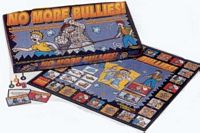 |
No More Bullies:
Learn how to deal with bullies. 2-4 players, $67.95 (ages 5-12)
|
|
No More Meltdowns
Game. ChildsWork ChildsPlay, $44.95 (ages 6-12)
This interactive tool is designed to establish steady communication about mood changes between a child with Asperger's Syndrome and a parent, teacher, or therapist so that meltdowns can be avoided. The goal of the game is to recognize the connection between patterns of daily behavior and emotions. When the child and adult begin to understand the emotions that precede a meltdown, they can learn to stop the behavior before it starts. For one child and one adult. |
|
The
Obesity Game. Isabelle Streng & A.M. Stradmeijer, $81.95
(ages 6 to 16)
The Obesity Game is a therapeutic
board game for overweight children and adolescents devised to identify
and change behavioural eating and exercise patterns and to facilitate
the understanding and disclosure of the complex feelings these children
experience.
Based on an integrative psychotherapy model, it incorporates psycho-education
and systemic, cognitive-behavioural and humanistic orientations.
The game should be facilitated by a health or mental health professional
(who may participate as a co-player) and is intended to be used
with groups, although it may also be used with individuals. It can
be tailored to the pace of the treatment process. The recommended
age range for participants is 6 to 16 years, but the game can be
adapted for working with older adolescents or adults. |
Back to top
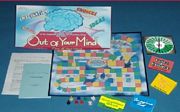 |
Out
of Your Mind Game™. Franklin Learning Systems, $76.95 (Gr.
1 to Adult)
Players will enhance their communication,
listening, and decision making skills. The game helps players to
improve their ability to understand others and experience empathy.
Activities are designed to make sure that all this takes place in
an atmosphere that is emotionally safe and supportive.
This non-competitive game has two sets
of winners: the counselor or therapist wins by drawing important
information out of the players’ minds, and the players win by learning
important social skills.
|
|
Play-2-Learn
Dominoes™ - Feelings Fun. Franklin Learning Systems, $38.95
(2-5 players; Grades 1-5)
In this new game, players have fun playing
dominoes while learning how to express positive and negative feelings
appropriately, recognize feelings, and care about the feelings of
others.
Play-2-Learn Dominoes™ - Bully
Wise. Franklin Learning Systems, $38.95 (2-5 players; Grades
1-5)
Players learn how all kids can work to
reduce bullying and violence.
Play-2-Learn Dominoes™ - Anger Control.
Franklin Learning Systems, $36.95 (2-5 players; Grades 1-5)
Players have fun playing dominoes while
learning to manage their anger and problem-solve in a thoughtful,
assertive, and respectful way.
Play-2-Learn Dominoes™ - Friendship.
Franklin Learning Systems, $38.95 (2-5 players; Grades 1-5)
In this new game, players have fun playing
dominoes while learning how to make new friends, be a good friend,
and resolve conflicts in a win-win way.
Play-2-Learn Dominoes™
- CyberSmart. Franklin Leaning Systems, $38.95 (2-5
players; Grades 3-7)
Play-2-Learn Dominoes —CyberSmart is
an educational domino game designed to teach young people how
to navigate the dangerous waters of the Internet, including wireless
devices such as cell phones, PDA's, and MP3 players. Major topics
covered include Internet predators, Internet bullying, scams,
viruses, and the practice of pro-social Internet behavior.
Play-2-Learn Dominoes™ - Character
Strength. Franklin Learning Systems, $34.95 (2-5 players;
Grades 2-8)
Based on the dynamic field of positive psychology, Play-2-Learn Dominoes — Character Strength is based on the concepts of the new field of positive psychology. Designed to build strong character in kids, the strengths emphasized in this game are kindness, self control, forgiveness, modesty, leadership, and social intelligence.
Play-2-Learn Dominoes™ - Conflict
Cruncher. Franklin
Learning Systems, $38.95 (2-5 players; Grades 1-5)
CONFLICT CRUNCHER is a game designed to
give kids the knowledge and skills they need to resolve conflict in a
non-violent, win-win way.
Play-2-Learn Dominoes™ - Empathy
Counts. Franklin Learning Systems, $34.95 (2-5
players; Grades 2-8)
Players have fun playing dominoes as
they learn how to consider the feelings of others and demonstrate empathy..
Play-2-Learn Dominoes™ -
Building Character. Franklin Learning Systems,
$38.95 (2-5 players; Grades 2-8)
Players learn how to build character in
five important areas — respect, honesty, caring, responsibility and fairness. |
|
|
|
|
|
|
|
|
Back to top

|
Problem-Solving Photo Scenes. Mary Pitti & Elizabeth Begley, $73.95 (all ages)
Improve recall, problem-solving and
reasoning skills with these realistic photo scenes and question prompts. Common
problem situations that clients face are represented in these 75 realistic
full-color photo scenes. The problems depicted are those found in the home and
community along with safety-specific situations. PROBLEM-SOLVING PHOTO
SCENES includes reproducible record-keeping forms and feature:
- New, realistic photo scenes
- Technology related situations
- Questions that enhance recall as well as a range
of cognitive skills
You'll want these cards for your
individual or group therapy for clients along the age and disability continuum.
Five easy-to-use critical thinking questions are printed on the reverse side of
each photo card. These questions prompt your clients to identify problems,
consider alternatives, determine solutions, and describe how the problem
relates to their life experiences. The questions vary in difficulty, making
them ideal for use with a wide range of clients. Modify the questions to match
the different cognitive levels of each client. |
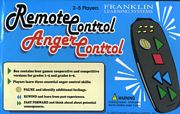 |
Remote
Control Anger Control. Franklin Leaning Systems, $38.95 Grades
2–5 & 6–9
The Remote Control Anger Control™
game is a set of four card games that focuses on three essential
skills for controlling anger:
- PAUSE and identify additional feelings
- REWIND and learn from past mistakes
- FAST FORWARD and think ahead about potential consequences
The game uses these remote control symbols
to facilitate learning the skills. There are both competitive and
cooperative versions for grades 1–5 and for grades 6–9.
Remote Control Impulse Control. Franklin Leaning
Systems, $36.95 Grades 2–5 & 6–9 |
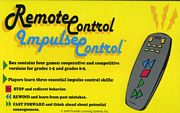 |
Back to top
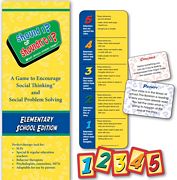
|
Should I or Shouldn't I? A Game to Encourage Social
Thinking and Social Problem Solving. Dominique
Baudry, $34.95 (Elementary School Edition)
SHOULD I OR SHOULDN’T I — ELEMENTARY EDITION is a
fun way for children to explore a variety of social behaviors from other
people’s perspectives. Players think about their own responses to various
situations posed on Prompt and Challenge cards, rate them on a 5-point scale,
and then learn how their choices match up (or don’t) with those of the other
players. Questions address a wide variety of age-related situations at school,
at home, at a friend’s home, and in community settings. |
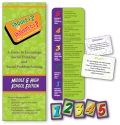
|
Should I or Shouldn't
I? ™ A Game to Encourage Social Thinking and Social Problem
Solving! Dominique Baudry, $34.95 (Middle & High School
Edition)
This adaptable game encourages
players to think about their own behavior choices and then compare how
their perceptions match (or don’t) those of the other players. It revolves
around the idea of perspective taking — being able to think about others, their
thoughts, feelings, and behaviors, and how this interrelationship plays out in
social situations. The game is based on the Social Thinking concepts and
vocabulary introduced by Michelle Garcia Winner and outlined in her many books
and articles on the topic. |

|
Should I or Shouldn't I? Elementary School Edition
Expansion Pack. Dominique Baudry, $24.50
Should I or Shouldn't I? Middle & High School
Edition Expansion Pack. Dominique Baudry, $24.50
Double your playing fun with the Should I or Shouldn't
I? Expansion Packs! This product is an add-on to the original Should
I or Shouldn’t I™ games. In the game, players ages rate a behavior in
a particular context on a scale based on whether the behavior was expected
or not, and then compare how their perceptions match (or don’t) to those
of the other players. Teachers, clinicians, and families have been playing this
game so often that they've gone through all the playing cards and have been
asking for more. Well — we listened!
Each expansion pack includes 300 new situations
that cover various age-related topics encountered
at school, home, and in the community. Add the new cards to your
existing game decks or use them on their own to prompt deep discussion and
learning on perspective taking, self-awareness, and executive functioning. |
|
Back to top
|
Smart Sharks: Life Skills Card Games. Franklin Learning Systems, $21.95 each
SMART SHARKS is a series of card games
based on the popular card game 21. In this challenging and fun game, players
learn key skills while they try to get as close to 21 as possible without
going over. These games use six different “smart” sharks to deliver the skill
sets in an effective way that middle-school kids can relate to. The scenario-based
cards represent the typical issues faced by middle school students on a daily
basis. Each shark represents a different skill set: stress, anger, leadership,
resilience, social networking, and conflict resolution. These games are a must
have for middle-school aged children trying to deal with the demands of their
peer group and challenges in school and after-school activities.
Smart Sharks: The Art of the Deal (Conflict
Resolution Tips)
Smart Sharks: Dive Into New Waters (New Kid
Survival Guide)
Smart Sharks: Dive into Social
Networking (“Netiquette” Essentials)
Smart Sharks: Don't Drown In Drama (Middle School
Challenges)
Smart Sharks: Hang in There (Lessons
in Resiliency & Adaptability)
Smart Sharks: Leadership — It’s Not
for Guppies (Lessons in Leadership)
Smart Sharks: Stress Can Mess with
You (Stress Management Tips)
Smart Sharks: Take a Chomp Out of
Anger (Strategies to Keep Your Cool) |
|
|
|
|
|
|
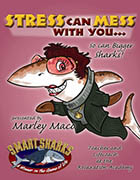 |
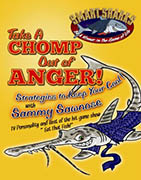 ; ; |
|
|
Social Skills Board Games. Smart Kids, $49.95
There are no right or wrong answers in these six unique
board games! Each game has players discuss the solutions to socially
challenging situations. Together the group decides upon the best action
encouraging all players to communicate, listen and participate in the game.
Ideal for use in small groups, these games will encourage your students to work
together as they learn to improve their social skills. The games target six
important issues that students often struggle with:
- Morals
- Manners
- Showing Emotions
- Managing Emotions
- Empathy
- Friendship
Contains six game boards, 24 counters, one die, and one
spinner. |
Back to top
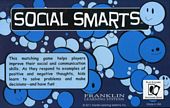
|
Social Smarts:
a Play-2-Learn Matching Game. Franklin Learning Systems,
$57.95 Grades 2-6
This matching game helps players improve their social and communication skills. As they respond to examples of positive and negative thoughts, kids learn to solve problems and make decisions. |
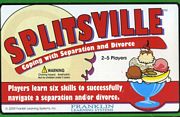
|
Splitsville. Franklin
Leaning Systems, $52.95 Grades 1-6
Children are faced with many challenges
when parents separate/divorce. Splitsville introduces children
to the skills they will need to successfully navigate a parental
separation. |
|
|
Stay Positive In a Jar® Tips, Quotes, and Questions to
Spark Upbeat Thoughts and Attitudes. Free Spirit Publishing, $14.99 (all
ages)
Boost positive thoughts and attitudes in kids (and
adults!) of all ages with these uplifting reflections, prompts, tips, and
quotes. Use the cards as a jumping-off point for conversation and contemplation
on positive thinking and for taking positive action in big and small ways. |
Back to top
|
Stop Being So
Mean! Board Game. ChildsWork ChildsPlay, $74.95 (ages 5-10)
In this game of cooperation, children learn to recognize when they are being mean to others and how to stop it. They also learn how to respond when others are mean to them. The players work together as a team to gather more tokens than the Mean Dragon collects. No one knows whether "meanness" or "kindness" will win out until the game ends and the tokens are counted. |
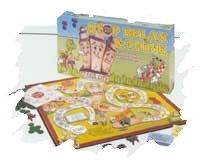 |
Stop Relax &
Think: a game to help impulsive children think before they can
act. 2-6 players, $79.95 (ages 6-12) Also: Stop, Relax &
Think Card Game, $34.95
|
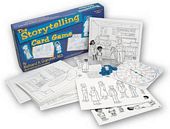 |
Storytelling Card Game: an instrument
for eliciting unconscious material at a predictably high frequency. $65.95 (ages 4-14)
The storytelling technique is one of the
most popular tools in child psychotherapy. Children's self-created stories
provide psychotherapists with valuable insights into the conscious and
unconscious problems with which their patients are dealing. This game is based
on the principle that children are more likely to provide stories in the
context of a mildly competitive game in which reward chips and prizes are
given. Children use any of 24 scene cards (living room, backyard, classroom,
kitchen, etc.) and 30 cardboard figures to tell their stories. |
Back to top
|
Talking, Feeling and
Doing Game: an instrument for
engaging the resistant child in meaningful psychotherapeutic endeavors. 1-5
players, $79.95 (ages 5-16)
Also: New additions to The Talking, Feeling &
Doing Game — card games which can be played by themselves or with the
original board game. Each set contains 99 cards and follows the format of the
original game, focusing on specific problems or concerns of children. Ages
6-12. (Note: unlike the original Talking, Feeling, Doing Game, these
cards are not restricted for use by mental health professionals and may be used
by any caring and concerned adult):
Talking, Feeling, Doing: Anger Card Game, $32.95
Talking, Feeling, Doing: Conflict Resolution Card Game, $32.95
Talking, Feeling, Doing: Divorce Card Game, $32.95
Talking, Feeling, Doing: Good Behavior Card Game,
$32.95
Talking, Feeling, Doing: Grief Card Game, $32.95
Talking, Feeling, Doing: Shyness Card Game, $32.95
Talking, Feeling, Doing: Teasing Card Game, $32.95
|
|
|
|
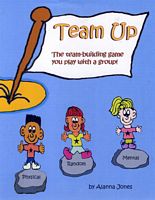
|
Team Up: the
Team Building Game You Play with a Group. Alanna Jones,
$47.95 |
Back to top
|
|
TeenSense: a Board Game for Teens, Ages 13-18.
Marjorie Mitlin, $75.95
This unique board game (for use in grades 6-12) gives
adolescents an opportunity to consider, discuss, and resolve uncomfortable,
embarrassing, or problematic interpersonal situations. As players move around
the game board, they respond to tough questions about friends, family, physical
changes, drug and alcohol choices, and intimacy in relationships. For 2 to 6
players or teams.
The TeenSense Game is designed to give adolescents
a chance to consider and discuss difficult issues that may crop up in their
daily lives. By asking them to look at and try to resolve uncomfortable or
problematic interpersonal situations, it gives them practice working out
relationships with their peers and with the adults in their lives. The point of
the game is to allow participants to explore each issue freely. The leader’s
job is to listen to and validate answers, prompt further discussion, and
request other suggestions when appropriate. The leader should not judge
students’ contributions. The game is full of emotionally charged material, and
the way students react to it will depend on their individual personalities,
backgrounds, and experiences. The leader should praise them for taking risks in
answering difficult questions and exposing their feelings. Similarly, the
leader must not allow players to put down others for their answers.
Because some of the game cards present situations
involving sexual activity (including same-sex) and the use of drugs and
alcohol, it is recommended that adults review all cards prior to play and
remove any that may be inappropriate for a particular group of teens. Blank
cards are provided for creating additional questions. |
|
|
Thought-Changing Cards for People Who Are Anxious,
Revised Edition. Lawernce Shapiro, $50.95 (ages 12 to adult)
These cards are intended to help clients control their
anxiety, and address the common emotional and social problems that accompany
anxiety disorders. The box contains 50 cards that show cognitive distortions on
one side, and rational responses and positive behavioral activities on the
other. |
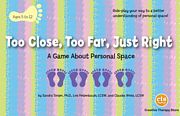
|
Too Close, Too Far, Just Right: a Game about Personal
Space. Sandra Singer, $50.95 (ages 5-12)
Many kids, especially those with ADHD, autism, or
Asperger’s, are unaware of the socially accepted physical boundaries that most
of us take for granted. This game helps them learn what’s “too close,” “too
far,” or “just right” in various social situations. Children take turns performing
social scenarios described on Role Play Cards, and then the group decides
whether their proximity to each other is appropriate for the particular
situation. Players learn that standing too close or too far away can make
people feel uncomfortable or confused in certain circumstances. Focused and
fun, this game is a gentle way to help kids grasp the idea of personal space
and thereby improve their relationships. For 4 to 8 players or teams, with a
teacher or therapist. |
Back to top
|
|
Too Much, Too Little, Just Right: a Social
Communication Game. Claudia Weiss, Sandra Singer & Lois Feigenbaum,
$65.95 (ages 5-12 years)
People communicate using not only words, but also tone of
voice and body language. Many children, however, fail to notice these relatively
subtle social cues. This game teaches children to pay attention to tone of
voice, observe body language, and note how these cues affect the message. Children
assume two roles during game play: Messenger and Listener. They learn by
observing others and by getting immediate feedback about their own expressive
abilities. They learn to adjust volume, expression, gestures, and other
physical cues in order to communicate effectively and achieve greater
self-control. Acquiring these skills helps children develop more appropriate
and satisfying social relationships. |
|
Toss and Learn Games. Franklin Learning Systems, $43.95 each (Grades 3-6)
This dice-game series helps
players learn important skills and apply them to commonly encountered
situations. The blue dice have situations, and the yellow dice have either
questions or actions. Players roll a blue die and then roll a yellow die.
Players apply the question or action on the yellow die to the situation on the
blue die.
Give Everyone a Fair Shake: Conflict Resolution Toss
and Learn Game.
Skills learned include:
being a good listener; learning to show respect; trying for a win-win solution;
taking responsibility for choices made; knowing when to walk away; learning not
to blame others.
Roll and Resolve:
Solving Problems with Friends Toss and Learn Game.
Skills learned include: talking it out with friends;
being fair to each other; being a good listener; learning to compromise;
showing empathy; recognizing when to apologize; learning to forgive.
Roll for Control: Impulse Control Toss and Learn Game.
Skills learned include: thinking before you act;
recognizing consequences of impulsive behavior; not acting on impulses; using
self-talk to help combat impulsive urges; taking responsibility for your
actions
Stand Against Bullying Toss and Learn Game.
Skills learned include: recognizing how to react to a
bully's behavior; understanding the role of the bystander; practicing
assertiveness techniques for the target; understanding when it's important to
bring in a trusted adult |
|
|
|
|
Back to top
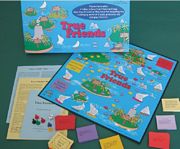 |
True
Friends Game™. Franklin Learning Systems, $51.95 (Gr. 3
– 6)
Players learn how to be a true friend,
to resist negative peer pressure from friends and other classmates,
and to strive to be themselves instead of trying to fit the unrealistic
cookie cutter mold of the “popular” girl or guy. As players strategize
their routes to True Friends Island, they navigate through dangerous
waters that surround a series of islands representing the challenges
that they face (Popularity and Pressure Island, Friendship Ups and
Downs Island, etc.).
|
|
|
What the Heck Does That Mean?! Using Picture Cards to
Teach Idioms. Susan Madden, $67.95 (ages 8 and up)
Idioms can be perplexing, especially to literal thinkers,
kids with ASD, and non-native speakers. Yet idioms are everywhere — so it makes
sense to teach them rather than try to avoid them. Each of these 125 Picture
Cards presents an idiom, illustrates its literal meaning, and offers three
choices: the true definition and two plausible but incorrect (and sometimes
funny) alternatives. The other side of the card shows only the idiom and the
illustration. So, depending on which side of the card you use, students can
choose the correct definition or come up with it on their own. Either way,
they’ll have a memorable visual association for each idiom.
These whimsical Picture Cards (along with 35 Bingo Cards,
also included) can be used to play a variety of engaging idiom games. A
Leader’s Guide offers instructions, ideas, and lots of fun follow-up
activities. Turn to this versatile resource whenever your students ask, “What the heck does that mean?” |
|
|
What If? In a Jar® Questions and Dilemmas to Get Kids
Thinking about Choices. Free Spirit Publishing, $14.99 (ages 8 & up)
Help kids hone their decision-making skills and practice
making good choices with 101 thought-provoking cards. Use this resource to
spark conversation and reflection in classrooms, advisory groups, after-school
programs, teams, and youth groups. |
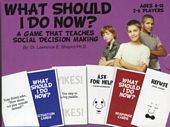
|
What Should I Do Now? A Game That Teaches Social Decision Making. Lawrence Shapiro, $34.50 (ages 8-18)
This game is designed to help children and youth understand the different reactions we can have in a variety of situations, and how our responses affect not just us, but those around us. |
Back to top
|
|
Yes I Can — Be Kind to Me. Gary Yorke, $24.95
(ages 10 to adult, 2-6 players)
Yes I Can — Family Talk. Gary Yorke, $24.95
(ages 6 to adult, 2-8 players)
Yes I Can — Feel Good about Me. Gary Yorke, $24.50
(ages 13 to adult, 2-6 players)
Yes I Can — Handle My Anger. Gary Yorke,
$24.95 (ages 6 to adult, 2-6 players)
Yes I Can — Have Impulse Control. Gary Yorke,
$24.95 (ages 6-14, 2-4 players)
Yes I Can — Kid Talk. Gary Yorke, $24.95
(ages 6 to adult, 2-6 players)
Yes I Can — Teen Talk. Gary Yorke, $24.95
(ages 13 to adult, 2-6 players)
Games and activities that foster social and emotional
skills, enhance communication, and support positive relationships. |
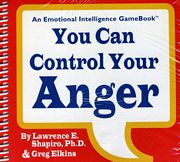
|
You Can Control Your
Anger: an Emotional Intelligence Game Book. Lawrence Shapiro
& Greg Elkins, $31.95, ages 5-12
Games are a great way to help children learn anger control,
but most games take time to set up and are difficult to transport.
This spiral-bound game book comes with an attached spinner, and
contains over 300 questions to teach children anger control.
The game can be played in just 10 minutes and is suitable for
individual or group counseling as well as home or classroom use. |
Back to top
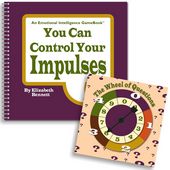
|
You Can Control Your Impulses Spin
& Learn Game Book. Elizabeth Bennett, $31.95 (ages
5-12)
Help children learn to control their
impulses in all kinds of every-day situations. Over 300 questions encourage
children to stop and think about their behavior and the likely outcomes. The
spiral bound book comes with a detachable spinner and provides a fun, lively
way to help impulsive children learn to think before they act. The games are
suitable for individual or group play and can be used in the home or classroom.
Includes bonus CD with games and forms. |
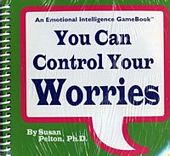
|
You Can Control Your Worries Game Book. Susan Pelton, $31.95 |
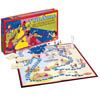
|
The You & Me Social Skills Board Game. ChildsWork ChildsPlay, $84.95 (ages 4-12)
This popular board game teaches children important day-to-day social skills. For 2-4 players. |
Back to top

Didn't
find it...?
Not sure...?
Need a suggestion...?
There are over 10,000 titles listed on our website and more than 35,000 titles in our inventory. If you haven't found what you want on the website — and it's one of our specialties — chances are good that we carry it, or can get it for you. Just let us know what you're looking for.
Call us toll-free 1-800-209-9182
or e-mail
PARENTBOOKS
is pleased to invoice institutions. Please inquire regarding terms and
discounts. Shop in person, by phone, fax, mail or e-mail . VISA, Mastercard
and Interac are welcome. We are open from 10:30 to 6:00 Monday through Friday and from 11:00 to 5:00 on Saturday.
 All prices are in Canadian dollars
and are subject to change without notice. All prices are in Canadian dollars
and are subject to change without notice.

|